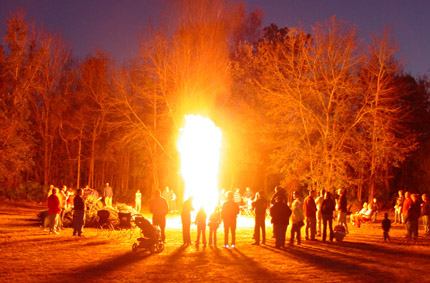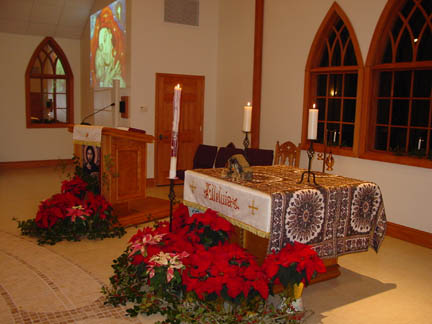Is Christmas pagan?

A reader asks, "Did Christmas start as a pagan holiday?"
The short answer would be yes, as December 25 was the Roman feast of Saturnalia, and their were other pagan (pre-Christian European religions) holidays which fell near the winter solstice, marking the shortest day of the year. But that's the short answer and it misses the larger point.
The longer answer is that there is nothing pagan about Christmas. What it is in fact is an attempt to wipe out pagan practices from a culture. And that attempt was quite successful.
The first change to making a pagan holiday Christian was when in 350, Pope Julius I declared that Christ’s birth would be celebrated on December 25. This was so that it would take over a pagan celebration. But the best explanation of the intent in changing pagan holidays comes in some correspondence that would follow centuries later.
Augustine of Canterbury was a monk sent Pope Gregory to evangelize the Angles (from which we get the words anglo and anglican among others) living in Britain. After Augustine and a group of monks arrived and begin to live and pray among the peoples around Canterbury England, they ran into a lot of sticky problems and Augustine wrote his boss, Gregory to ask for advice on some of these problems. Their correspondence survives in a book by the author Bede called The Ecclesiastical History of the English People written in the year 731. In that book, it notes that Augustine and his fellow monks were successful in coverting the people because,
They practiced what they preached, and were willing to endure any hardship, and even to die for the truth, which they proclaimed.A key problem was that pagans once converted still wanted to return to old holy sites as they were fond of them and they liked the old pagan festivals to which they were accustomed. Gregory wanted these pagan places and holidays "baptized" or made holy through Christian use. They were to use pagan places of worship, but to do so by destroying the idols found there and exorcising the place, then building Christian altars and bringing Christian worship to the spot. Then the people could worship the one Triune God in the place now sanctified for that worship.
Gregory wrote to Augustine,
For if these temples are well built, they must be purified from the worship of demons and dedicated to the service of the true God. In this way, we hope that the people, seeing that their temples are not destroyed, may abandon their error and, flocking more readily to their accustomed resorts, come to know and adore the true God.Further, they were to take pagan holidays and end the slaughter of animals as sacrifices, but substitute for those solemnities other Christian holidays. In this way Christmas and Easter were attached to pagan holidays and given an all Christian significance. The date of December 25 may have been a pagan choice, but the purpose was now to be a celebration of the incarnation, God becoming man in Jesus.
Gergory wrote,
They are no longer to sacrifice beasts to the Devil, but they may kill them for food to the praise of God, and give thanks to the Giver of all gifts for the plenty they enjoy. If the people are allowed some worldly pleasures in this way, they will more readily come to desire the joys of the spirit. For it is certainly impossible to eradicate all errors from obstinate minds at one stroke, and whoever wishes to climb to a mountain top climbs gradually step by step, and not in one leap.Gregory's plan, which may seem like a marketing ploy, bore good fruit. The people worshipped in new ways in familiar places and times and in generations the old sites and practices were fully Christianized. People came to think of December 25 only for its new Christian message of “God with us” in the celebration of the Christ Mass or communion service held in honor of our Lord's birth.
The struggle to Christianize pagan practices continued for centuries more. Christmas trees are a remainder from a German pagan celebration at the winter solstice. In 1521 in the Alsace region of Germany/France. A Lutheran pastor declared: “Better that they should look to the true tree of life, Christ” and brought the evergreens into Christian use for Christmas.
There was a holy purpose accomplished in the ongoing process and while Christmas fights secularism now even the secular meaning of Christmas, which seems to be attached to gathering with family and friends to share gifts, at least flows from the Christian ideal of celebrating the gift of God's own self in Jesus. We are in danger of losing the "God with us" message of celebrating Immanuel's birth, but that is due to our own consumer culture and commercialism taking over a Christian feast and not because of Christmas' pagan roots. The old solstice holidays of Christmas and Easter were truly baptized and did come to hold Christian meaning rather than pagan ones.
In the archives are the sermons, Have yourself a materialistic Christmas and Making Room for Christ.
Note: Our King of Peace Christmas party is tonight at 7 p.m. You may bring a snack to share. You should also bring a cheap (dollar store) wrapped gift to exchange. Gag gifts are encouraged. This is not a pagan practice, but a great way to get to know your fellow church goers.
peace,
Frank+
The Rev. Frank Logue, Pastor + King of Peace Episcopal Church








5 Comments:
At 7/05/2007 11:27 AM, Anonymous said…
Anonymous said…
I know its not Christmas anymore, but I was wandering around the internet when I happened upon your blog. I respect your Christian views and therefore won't say anything cruel or unusual. But instead I will thank you for posting your blog in such a way I didn't feel any offense in reading it, although I can't recall a time I've praised satan.
At 12/31/2007 12:21 PM, Anonymous said…
Anonymous said…
I am reading this over a year after your post. I thank you for your views on Christmas being a pagan holiday. I have heard that over and over again, while I didn't believe it I didn't have much knowledge to object the statement. Now, thanks to your post I have some information to go by which will lead me to study and pray more on the subject so that when the topic comes up again, I can have some understanding of the subject matter. I enjoy Christmas and am offended when someone says that I am participating in a pagan holiday because that isn't what I represent Christmas to be. I believe it is the celebration of Christ's birth, not his birthday per se.
At 12/23/2008 3:44 AM, Anonymous said…
Anonymous said…
Wipe out their beliefs....Just because you belief something different gives you no right to wipe out a religion regardless of who you are. Christians try to dominate everything we do, our government, etc etc. Christmas, the 25th, is pagan in its root, like you said, but stop plagiarizing the original ideas as your own, you can worship your god, let me worship my goddesses, tolerance, not wiping out ideas!
At 12/30/2012 9:27 PM, Anonymous said…
Anonymous said…
Nice try. There are no pagan holidays (Holy Days). The Sun moon and stars, or their alignments and/or positions that Paganism worships are creations of God (I'll be clear, Jesus Christ of the Holy Bible, Lord of all creation).
In the earliest records found the world worshiped the Son of God from 6000 - 4500 years ago. The worship of the sun appeared 4400 years ago, and 200-300 years later Pantheism reared it head.
All days were created by God. The days declared by Pagans as them their own are stolen from God. Whatever the process and perversion of these days, all of them were created for the purpose of worshiping God (see above).
For example: On the day that the wisemen left Jerusalem, they were folloing a star, the star of King David, or Jupiter. This Planet was in retrograde motion. It stopped directly above the small building in Bethlehem where the incarnate Son of God, Jesus Christ was living. They went to this building and inside they found the Blessed One, Immuael, Jesus Christ and delivered their gifts. Gifts fit for a king, to the King of the Universe. That day was Dec 25. The day Christians celebrate today as the day the Gentiles came to give gifts to the Christ Child.
What do Christians do on this day? We read this account to our children and in the spirit of the wisemen, we give gifts to children and each other and most importantly to Christ.
Historically there have never been holidays for pagans. The reasons Christian worship the Christ are verifiable facts.
At 11/18/2017 12:23 PM, jade said…
jade said…
That is what many people do year after year. It’s an unofficial holiday which refers to a Winter-Christmas-themed celebration held in July.
click here
Post a Comment
<< Home